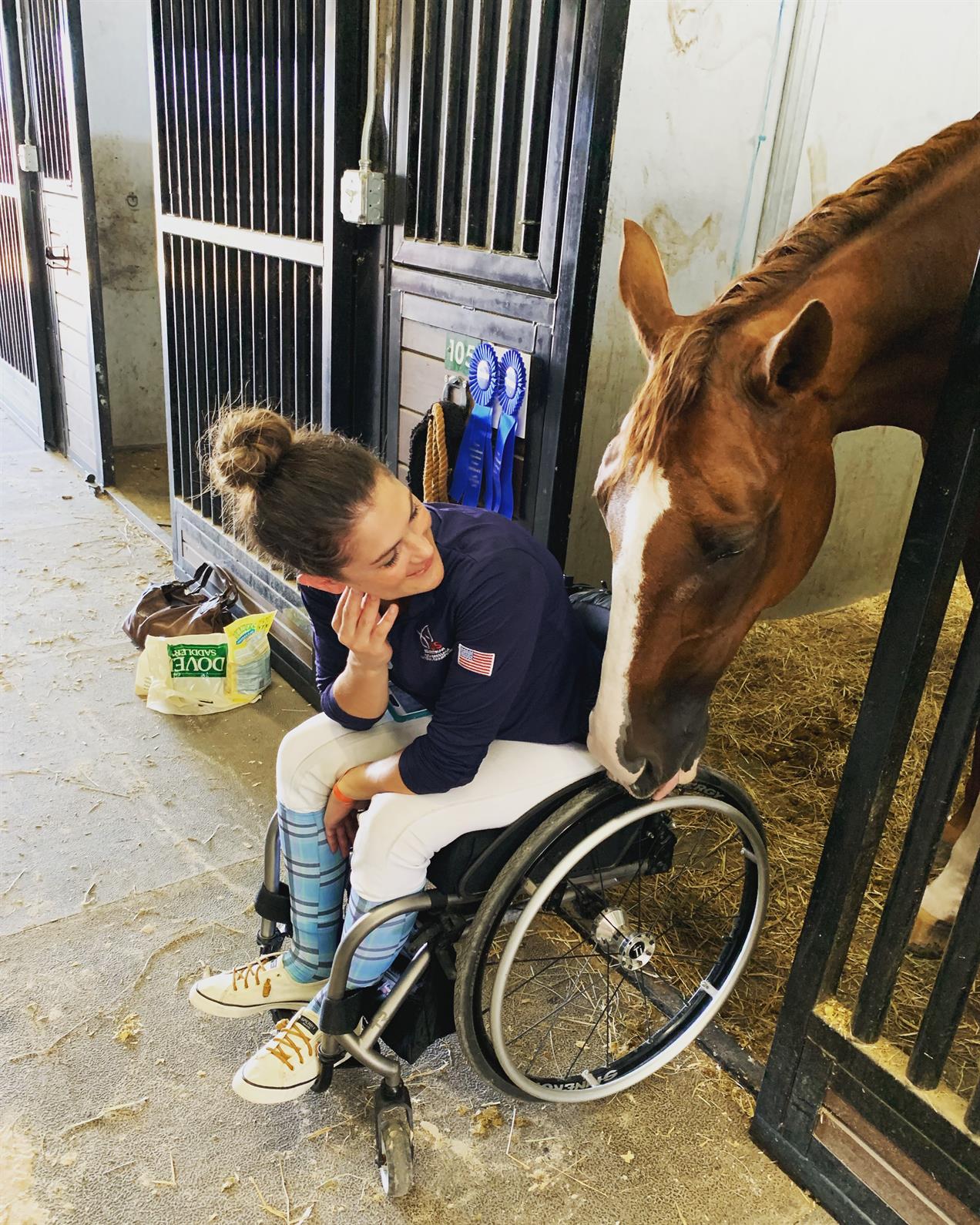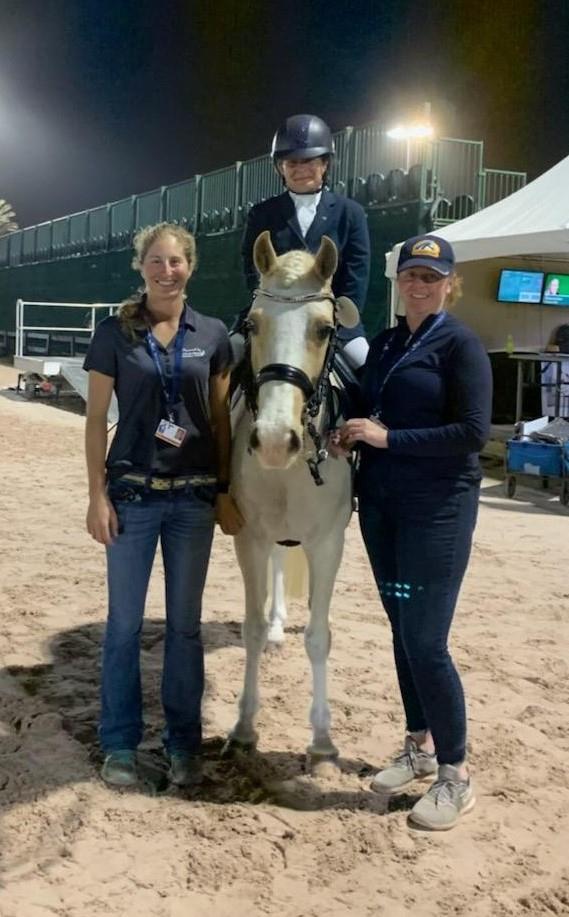Exploring new breeds and disciplines is one of the most fun parts about being an equestrian. As we challenge ourselves to learn a new style of riding or master different training techniques, we inevitably become better athletes and horse people. Newcomers to U.S. para-dressage Meghan Benge (Windsor, S.C.) and Erika Wager (Delmar, N.Y.) are doing just that, and making a splash as they do.
Benge and Wager are both veteran competitors in a multitude of other disciplines, including endurance, hunters, combined driving, and even Thoroughbred racing and retraining, and were recently awarded grants from The Dressage Foundation’s Para-Equestrian Dressage Fund to support their growth in the para-dressage discipline. Both athletes are working to qualify for and compete at the Adequan®/USEF Para Dressage National Championships in the next couple of years.

Getting Started in Para-Equestrian Disciplines
Wager (Grade II) began training in para-dressage just one year ago, but she has been riding since she was five. She started out in the Western discipline, eventually competing in endurance at the FEI level and working as an exercise rider in the Thoroughbred racing industry. After sustaining serious injuries from a fall on the track, Wager became paralyzed from the waist down.
“It was super-scary and it took me a while to get over it. But I got back on a horse six months after, as soon as my surgeon said I could. He thought I was crazy, but I had to try,” Wager said, laughing.
“I decided I wanted to do [para-dressage] when I was still in the ICU, actually. My brother was showing me how many different things I could do,” Wager continued. “I was looking on the USEF and United States Para-Equestrian Association websites and realized I could still [ride,] and even try to go to the Paralympics! It was all still a dream, you know, because I was literally in hospital, but I thought it would be a great goal to set for myself.”
Benge (Grade III) first started riding at a therapeutic riding center when she was six. “I couldn't really do a lot of sports and stuff, because of my disability. So my mom took me to the therapeutic riding program and after a while, they said [my riding abilities were] kind of beyond what they could offer,” said Benge.
From there, Benge became actively involved with combined driving, rising through the FEI world rankings and earning individual gold and team silver medals at the 2008 FEI Para Driving World Championships before making the switch to para-dressage in 2017. Benge made her first trip to the Adequan®/USEF Para Dressage National Championships last year with Worth the Trip, her 22-year-old Welsh pony cross gelding.
New and Old Partnerships Show Promise in Para-Dressage

Every para-equestrian’s needs in a horse/pony will be different, depending on that individual’s physical strengths, weaknesses, and necessary adaptions. Horses competing in para-dressage need to be as talented as able-bodied dressage horses, with additional considerations regarding their personalities and adaptability to new training techniques.
Benge and one of her para-dressage ponies, Zoey, a 13-year-old Welsh pony mare, already have a long history and solid partnership. Benge has been working with Zoey since she was a three-year-old, training her to drive and ride. The driving training has proven to be advantageous in the dressage arena.
“For me, the length of my legs is inhibiting, so I use whips and really have trained her to voice commands,” said Benge. “I have a different noise I make when I want my pony to sit up more or go forward more, a different sound for a medium [trot,] so some of that is a little easier for me coming from driving. As a driving pony, they’ve been trained to listen to my voice.”
Benge has a particular fondness for the Welsh and believes the breed’s characteristic good nature is what makes Zoey such a good partner.
“I love my Welsh ponies; they’ll always have my heart. Zoey’s walk is not quite what [the judges] are looking for, but I just love riding and showing her, so I keep seeing how much I can do with her,” said Benge. “My family actually breeds Welsh ponies, so we have an assortment. Our stallion has this superb temperament and he’s passed it on to all of his babies. Their adaptability and the willingness to play along or figure out what it is you want is so important.”
Wager’s beloved mount, Clifton Zander, a 16-year-old Thoroughbred/Selle Français gelding and former eventer, may be a new partner, but Wager values all the lessons and growth that has come from their partnership as she makes her debut in the para world.
“[Zander] is an awesome horse, maybe not the best fit for para-dressage, but he is teaching me to be better all the time, which is really good,” Wager continued. “We are super-focused on my training. I am not in any rush; I would rather get it right. I know what my goals are but I’m going to go at my own pace.
“I definitely need a horse that's good on the ground, with the wheelchair and everything. They would also need to have a comfortable, steady trot because I can't post,” Wager said. “They have to be good with whips, since I use those as my legs. [Zander] has been really good about it, and it has helped him push more from behind and really be a dressage horse!”
Finding Community and Finding Funding
These up-and-coming athletes agree that the best part about dressage is that there is always something to learn and something to improve upon, and having a strong team behind you is essential in making the most of all the hard work and training.
For Benge, having a coach who fills in the gaps within her own skillset has made all the difference, “My coach, Melissa [Vaughn,] rides young horses and upper-level horses, so she’s helped solidify some of that basic training to be able to take the next step,” Benge said.
“I really like having [a coach] that knows you and can communicate with you about theory, but also the practical stuff,” she added. “People can get caught up in how it should look, but I need someone to say, ‘More outside right now,’ and ‘Put your leg on now!’ Telling me what to do and when has made the biggest difference in my riding.”
Finding funding through grants and scholarships can be time-consuming, but they provide excellent opportunities for any ambitious equestrian to help their dreams become reality. When looking for funding opportunities, Wager recommends internet and social media searches, becoming familiar with opportunities from your recognized affiliate, and leaning on your community in the horse world.
“Finding grants, and finding the ones that you qualify for, can be a little bit difficult. But what helped me the most was looking online at USEF, USPEA, things like that,” said Wager. “At first, it seemed a little daunting to me, having no experience in the para world whatsoever. But once you're in it, everybody's super-nice and welcoming and very helpful. When I had that circle, it was much easier to navigate everything.”
Trying new things is a little scary and can be challenging, but these para-dressage athletes faced their fears and encourage others to do the same! “Nobody has it all figured out. Enjoy the process and have fun,” said Wager.
“Just keep working and get out there with what you've got! Try not to be overwhelmed by everyone else, because everyone started somewhere,” Benge echoes.
Learn more about para-dressage and other para-equestrian programs by visiting the United States Para-Equestrian Association, a recognized affiliate of US Equestrian. Follow the USPEA on Facebook and Twitter.
Stay up to date on news and information about US Equestrian’s para-dressage programs and teams by following USA Para Dressage on Facebook and USA Dressage on Instagram. Use #USAParaDressage.


